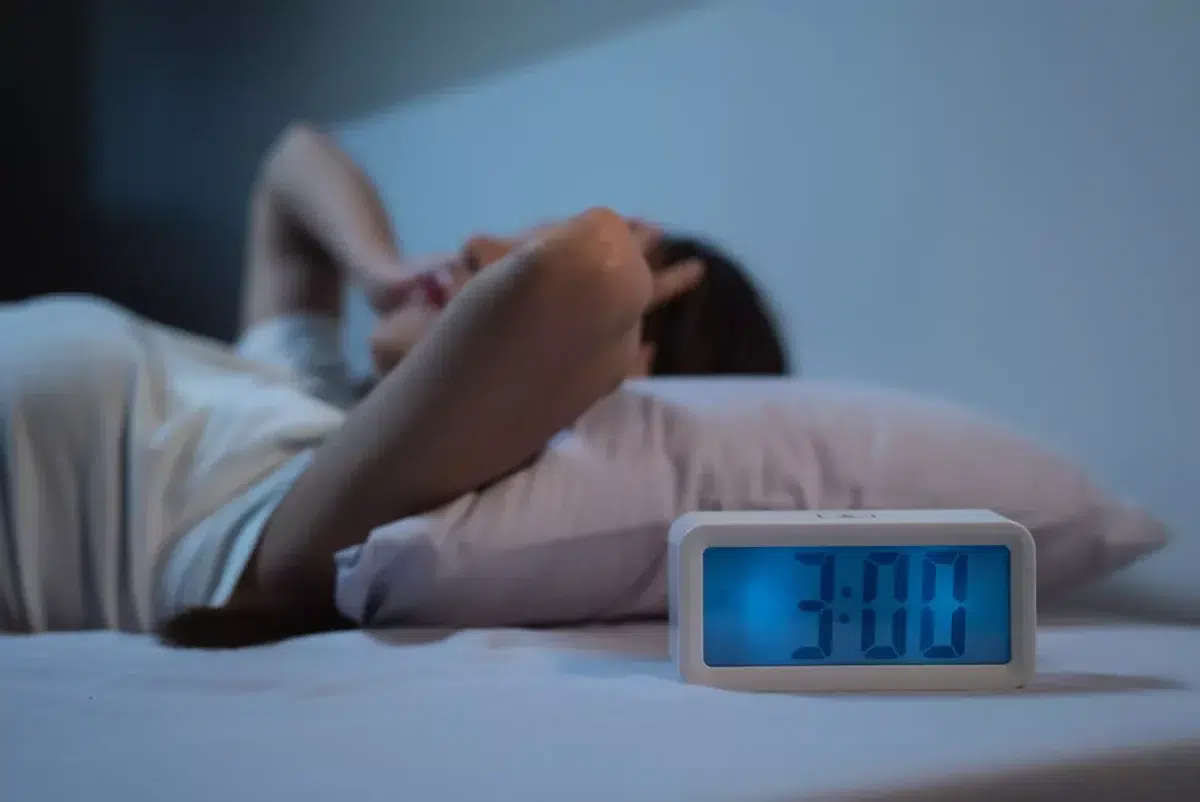Show table of content Hide table of content
Have you ever found yourself wide awake at 3 AM, staring at the ceiling, unable to fall back asleep? You’re not alone. Nighttime awakenings affect millions of people worldwide, disrupting sleep cycles and leaving many exhausted the next day. Recent surveys indicate that over 70% of adults experience at least one nocturnal awakening regularly, with many struggling to return to sleep afterward.
Why we wake up during the night
Anxiety stands as the primary culprit behind those frustrating middle-of-the-night awakenings. Your brain, processing worries about upcoming events or unresolved issues, triggers your body’s stress response system. This biological reaction increases heart rate and releases cortisol, effectively pulling you from deep sleep into wakefulness.
Sleep architecture naturally changes as we age. Older adults often experience more fragmented sleep patterns without necessarily needing less total sleep. “The sleep distribution shifts throughout the 24-hour period as we age,” explains sleep researchers. This redistribution often manifests as increased daytime drowsiness and more frequent nighttime awakenings.
Environmental factors significantly impact sleep quality too. Room temperature, noise levels, and light exposure can all trigger unwanted awakenings. Even your sleeping partner’s movements or breathing patterns might disturb your slumber without you realizing it.
Lifestyle choices made hours before bedtime can return to haunt your sleep. Consuming alcohol before bed disrupts brain function during sleep, often causing you to wake up during the night as your body metabolizes it. Similarly, caffeine consumed even six hours before bedtime can interfere with sleep quality.
Health conditions like sleep apnea, acid reflux, or chronic pain frequently manifest as nighttime awakenings. These physiological disruptions often require medical intervention beyond simple sleep hygiene adjustments.
The critical 15-minute rule for nighttime awakenings
Sleep experts universally recommend the “15-minute rule” as the gold standard for handling nighttime awakenings. If you find yourself awake and unable to drift back to sleep within 15 minutes, don’t continue lying in bed frustrated. This approach can actually transform temporary wakefulness into conditioned insomnia.
Science This strange red lake in Tanzania turns animals to ‘stone’.
Instead, leave your bedroom and engage in a calming activity under dim lighting. Reading a physical book (not an e-reader), listening to gentle music, or practicing breathing exercises creates the right conditions for sleepiness to return naturally. The goal isn’t to force sleep but to distract your mind from the pressure of needing to sleep.
Many find that protecting their mental peace through meditation or progressive muscle relaxation techniques helps quiet racing thoughts. These practices activate your parasympathetic nervous system, countering the stress response that likely woke you initially.
Temperature regulation plays a surprising role in returning to sleep. Your body naturally cools during sleep, so a brief exposure to slightly cooler air followed by returning to a warm bed can trigger sleepiness. This mimics the natural temperature drop that accompanies sleep onset.
The way you respond to wakefulness matters tremendously. People who recover quickly from sleep disruptions typically avoid catastrophizing about lost sleep. Remember that occasional awakenings are normal, and your body has remarkable compensatory mechanisms for less-than-perfect nights.
Prevention strategies for uninterrupted sleep
Building a consistent sleep schedule strengthens your circadian rhythm. Going to bed and waking up at the same times every day—even weekends—reinforces your internal clock. This biological synchronization dramatically reduces random awakenings over time.
Physical activity fundamentally improves sleep quality. Even walking one mile daily increases your likelihood of sleeping through the night. Exercise enhances slow-wave sleep—the deepest, most restorative stage—while helping dissipate stress hormones that might otherwise disturb sleep.
Your bedroom environment deserves careful attention. The ideal sleep space remains slightly cool (around 65°F/18°C), completely dark, and reasonably quiet. Investing in light-blocking curtains, comfortable bedding, and possibly white noise generators creates optimal conditions for uninterrupted sleep.
Evening routines significantly impact sleep continuity. Establish a wind-down period beginning 90 minutes before bedtime. During this time, avoid screens, work-related activities, and stimulating conversations. Your brain interprets these as signals to remain alert rather than prepare for rest.
Science 50 years later, a quantum mystery has finally been solved.
Surprisingly, your personality type influences sleep patterns. More neurotic individuals typically experience higher rates of night awakenings. Recognizing these tendencies allows you to implement personalized strategies, such as journaling before bed to offload worries.
When to seek professional help
Persistent sleep disruptions warrant professional attention. If nighttime awakenings occur three or more times weekly for over a month, consider consulting a sleep specialist. These experts can identify underlying conditions that home remedies might not address.
Cognitive behavioral therapy for insomnia (CBT-I) has shown remarkable effectiveness for reducing nighttime awakenings. This structured program helps identify and replace thoughts and behaviors that cause or worsen sleep problems with habits that promote sound sleep.
Some people benefit from short-term medication use while developing better sleep habits. However, sleeping pills aren’t typically recommended as a long-term solution due to potential dependence and diminishing effectiveness over time.
Science These people were paid not to use Google, yet they couldn’t resist.
Alternative approaches like acupuncture, biofeedback, and specialized breathing techniques have helped many overcome sleep maintenance insomnia. These methods often work by addressing the anxiety component that frequently underlies nighttime awakenings.
Addressing sleep disruptions often requires confronting deeper psychological patterns. Boosting your confidence by eliminating self-doubt creates emotional resilience that naturally improves sleep quality. This mind-body connection highlights why holistic approaches to sleep problems often succeed where purely physiological interventions fail.


